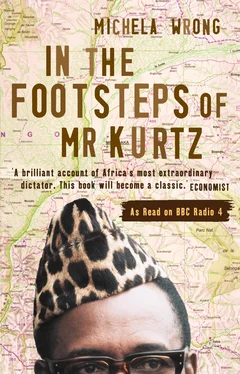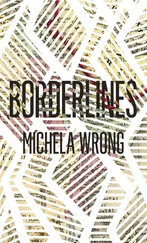Family in dire straits at home? There are agencies here where you can go, deposit 100 dollars, sure in the knowledge that a dependant at the other end in Kinshasa will receive another 100-dollar bill, all without going through a bank. Relatives going hungry or can’t afford the price of an electrical appliance? The same procedure is available for a sack of rice or a fridge. And when disaster really strikes you can even, through these tiny offices, arrange a funeral back in Congo.
The entrepreneurship extends well beyond the law’s reach. A vibrant trade in second-hand cars, drugs and forged cheques, prostitution and fake visas, plus the designer brand shoplifting, has prompted Belgium’s police to establish a unit specialising solely in crime committed by members of the Congolese community, something of a mark of distinction given the far greater numbers of Moroccans and Turks in Brussels.
Despite all the cheering inventiveness, there’s a tragic poignancy about Matonge. The alliterative Lingala slang residents use to refer to life abroad is premised on vaunting ambition, but the aspirations come tinged with a sense of inferiority. For those abandoning Kinshasa, despairingly dubbed ‘Kosovo’, Belgium is ‘lola’, or ‘paradise’. Paris, another favourite destination, is known as ‘Panama’. Europe is ‘mikili’, ‘the promised land’, inhabited, appropriately enough, by ‘mwana Maria’, ‘the children of the Virgin Mary’ – whites.
This is a community determined to outstay its welcome, made up of forty-year-old students with a smattering of children and fistfuls of degrees; of young men playing up their brushes with the law in Kinshasa in the hope of winning the sobriquet of ‘political asylum-seeker’; of youths plotting marriages of convenience with Belgian mates: all and any methods are acceptable in the quest for the ultimate prize – a permit allowing an indefinite stay in Europe.
When it is won, such documentation rarely goes to waste. ‘Whites say that all blacks look alike,’ explained Leon, a philosophy graduate studying accountancy, ‘so someone with papers will lend them to a friend who wants to cross into France or Switzerland, who will then post them back to Brussels.’ Without the paperwork, work outside the informal sector is impossible. So Brussels’s restaurant kitchens, its building sites, its minicab firms, are staffed by Africa’s most well-qualified students.
The sense that only the West offers hope of improvement is enough to make even the uninspiring seem acceptable. ‘I have friends who are vegetating here. They do nothing, they stagnate, but they don’t dare go back,’ said Leon. ‘In the eyes of their families, returning from Europe means they have failed. And the worst thing you can have happen to you, the most humiliating, is to be expelled.’
Other African communities forced into exile organise guerrilla campaigns from abroad, hatch plots, or draw up political programmes for the distant day when they hope to take power. For decades, Eritrean émigrés ran an efficient informal tithing system which funded the rebel movement that eventually pushed Ethiopian occupiers out of their territory. Despite boasting one of the continent’s most formidable dictators as an antagonist to rally against, the Congolese have nothing to match this. If a rebel campaign is being fought in the east of their country, amongst the young men of Matonge there is no talk of donning camouflage and signing up. The biggest opposition party had closed its offices ‘for security reasons’, I was told, but administrative incompetence was more likely to be the cause. The collective sense is missing.
Congolese themselves acknowledge the lack, with a shrug of the shoulders and the rueful honesty that is in itself part of the problem of proscribed ambitions and low expectations. Each man’s aim is to leave Congo, acquire qualifications, and build a life somewhere else. Let someone else draw up a constitution. Let someone else rebuild the country. Experience has taught that politics is a game played by conmen and hypocrites.
What adds a bitter edge to this undignified scramble for the exit is the realisation that while thousands of Congolese immigrants would not be living in Brussels, Antwerp, Ghent and Liège were it not for their country’s historical ties with Belgium, a younger generation of Belgians is virtually unaware of that painful colonial past.
‘There is no African memory left,’ acknowledges Marcelin, who works for a struggling Congolese state company with offices in Brussels. ‘There are very few Belgians left in parliament or the ministries who worked in the colony, so the sentimental attitude of the past has gone. All that is left is a sense of disappointment with our leaders and negative associations of disaster, death and dictatorship. Young Belgians assume Congolese either make music all the time or are petty crooks. There is no sense of responsibility for what their country did in the Congo, let alone guilt.’
Despite the intimate historical relationship, no Belgian newspaper or radio station has a foreign correspondent permanently based in Kinshasa. In a country struggling with its own contradictions, preoccupied with prickly Francophone-Flemish relations, Belgian colonial history is not taught at school. The distorted vision of history the Royal Museum at Tervuren set out to sanctify has been incidentally fostered by the political sensitivities of modern Belgium.
Young Bruxellois live in a city dotted with baroque monuments funded with the proceeds of the Congolese state, scattered with antique shops selling Congolese masks and home to the biggest community of Congolese living abroad. Yet King Leopold’s Ghost , the first book in years to stir a general debate on the topic, was written by an American, not a Belgian.
As Jean Stengers, a retired professor who has written copiously on the Congo Free State, freely admitted, his pet subject remains almost exclusively in the narrow intellectual domain, a closed book to most fellow nationals. Working from a study crammed with leather-bound volumes and papers looking out on the bleak Rue de Couronne, the white-haired academic had criticised Marchal for his interpretation of history, arguing that the former diplomat ignored the fact that national glorification, rather than personal enrichment, was Leopold’s prime motivating factor. But if they differed in their views of the king, the two men shared a rueful awareness the topic they both regarded as of such importance was a matter of general indifference.
What feelings existed, Stengers said, were amongst a disappearing generation and – astonishingly – they were scarcely feelings of shame. ‘In the older generation, many of whom served in the Congo, the strongest feeling is one of injustice done. There’s a deep sense that magnificent things were given to the Congolese and we were rewarded with huge ingratitude. But the public at large has lost interest in the Congo. For the new generation, ignorance of Belgian history is nearly as great as ignorance of Congo’s history.’
Knowing nothing about the past, of course, frees a population from any sense of blame for the present. How convenient was all this forgetting, I wondered as I walked down the steps of Stengers’ house, given the débâcle of modern-day Congo?
The question Belgian researchers into the Congo Free State hate to be asked is whether there is any causal link between Belgium’s exploitative regime and the excesses of Mobutu’s rule, whether a frighteningly efficient kleptocratic system effectively softened up a community for a repeat performance.
Marchal had brushed it anxiously away, pleading that he was a historian rather than an intellectual, and it was not for him to make such judgements. When put to Professor Stengers, the question had been rejected with a categorical shake of the head. Citing sociological studies conducted in the Great Lakes region, he said what was striking was the lack of memories of the Leopold era amongst the local population. So how could there be any causal link?
Читать дальше












